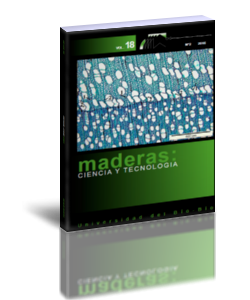Effect of the Brazilian thermal modification process on the chemical composition of Eucalyptus grandis juvenile wood - Part 2: Solubility and ash contents
Keywords:
VAP HolzSysteme®, 1% NaOH solubility, ash content.Abstract
This article reports continuation of a study of the influence of the Brazilian process of thermal modification called VAP HolzSysteme® on the chemical composition of eucalyptus wood. Flatsawn boards of Eucalyptus grandis juvenile wood were tested for four treatment levels: untreated, and thermally modified at final cycle temperatures of 140 °C, 160 °C or 180 °C. Chemical analyses were carried out according to the standards of the Technical Association of the Pulp and Paper Industry and encompassed 1% NaOH solubility and ash content. The 1% NaOH solubility increased in the wood thermally modified at 140 °C and 160 °C in relation to the untreated wood, but did not increase further 180 °C, indicating that the treatment at 180 °C was not enough to cause more degradation of hemicelluloses. In practice, the thermal modification process had no effect on the ash content of wood. The statistical difference observed between the treatment levels untreated and 160°C (0,04 percentage points) can be attributed to the heterogeneity of wood as a material.Downloads
Download data is not yet available.
Downloads
How to Cite
Batista, D. C., Bolzón de Muñiz, G. I., da Silva Oliveira, J. T., Benigno Paes, J., & Nisgoski, S. (2016). Effect of the Brazilian thermal modification process on the chemical composition of Eucalyptus grandis juvenile wood - Part 2: Solubility and ash contents. Maderas. Ciencia Y Tecnología, 18(2), 285–292. Retrieved from https://revistas.ubiobio.cl/index.php/MCT/article/view/2374
Issue
Section
Article

































